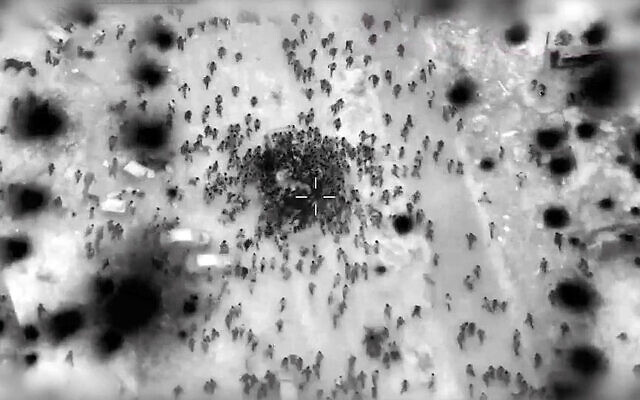The media once again is complicit in spreading news that implicates Israel for the deaths of over 100 Palestinians in Gaza as a mob rushed an aid convoy.
The headline in The Australian say Israeli forces fire on crowds surrounding Gaza aid trucks while The Age pointed the finger at Israel headlining with More than 100 killed as Israeli troops fire on Palestinians seeking food.
On RN Breakfast Patricia Karvelas had an anti-Israel Jeremy Konyndyk, President of Refugees International; former head of USAID’s Foreign Disaster Assistance program who said that the IDF doesn’t know how to properly deliver aid and so these are the consequences of what should have been managed by professional aid organisations.
In The Guardian it was reported a week ago UNRWA suspends aid to northern Gaza amid ‘collapse of civil order’ telling that the World Food Programme (WFP) said it had been forced to pause aid deliveries to northern Gaza due to “complete chaos and violence due to the collapse of civil order”, after an initial suspension three weeks earlier when a strike hit a UNRWA truck carrying aid.
In other words aid organisations are saying that are unable to deliver aid because the situation is too dangerous. Naturally UNRWA is keen to put pressure on Israel to force a humanitarian ceasefire that many countries are calling for as they hear about what happened with the deaths of many Gazans swarming the aid convoy.
IDF Spokesman Rear Adm. Daniel Hagari has said that troops fired warning shots in an attempt to disperse a mob of Palestinians rushing an aid convoy in northern Gaza, as dozens were killed amid a crowd crush.
“This morning, the IDF coordinated a convoy of 38 trucks to provide additional humanitarian assistance to the residents of northern Gaza. This humanitarian aid came from Egypt, went through a security screening at the Kerem Shalom humanitarian crossing in Israel, and then entered Gaza, for distribution by private contractors,” Hagari said.
“As these vital humanitarian supplies made their way toward Gazans in need, thousands of Gazans [rushed] the trucks, some began violently pushing and trampling other Gazans to death, looting the humanitarian supplies,” he says.
Hagari says “the unfortunate incident resulted in dozens of Gazans killed and injured.”
“Here are the facts: At 4:40 a.m., the first aid truck in the humanitarian convoy started making its way through the humanitarian corridor that we were securing. Yes, the IDF was securing the humanitarian corridor so that the aid convoy could reach its destination in northern Gaza,” he says.
“Our tanks were there to secure the humanitarian corridor for the aid convoy. Our UAVs were there in the air to give our forces a clear picture from above,” Hagari continues.
“At 4:45 a.m., a mob ambushed the aid trucks, bringing the convoy to a halt,” he said.
“When the hundreds became thousands and things got out of hand, the tank commander decided to retreat to avoid harm to the thousands of Gazans that were there,” Hagari says.
“You can see how cautious they were when they were backing up. They were backing up securely, risking their own lives, not shooting at the mob,” he continued.
“The Israel Defense Forces operates according to the rules of engagement and international law. No IDF strike was conducted toward the aid convoy,” Hagari said, amid claims by Hamas that 104 people were killed and hundreds more were wounded.
“On the contrary, the IDF was there carrying out a humanitarian aid operation, to secure the humanitarian corridor, and allow the aid convoy to reach its distribution point, so that the humanitarian aid could reach Gazan civilians in the north who are in need,” he says.
Hagari says the IDF has been conducting operations of this kind “for the last four nights without any problem, this is the first night we have had any kind of event.”
“This humanitarian aid was coordinated by Israel, for the people of Gaza. We want the aid to reach the people of Gaza. We are working around the clock to make this happen. Israel puts no limits on the amount of aid that can go into Gaza,” he said.
“We are working together with humanitarian organizations and the international community to help them solve the issue of aid distribution inside Gaza, it is a problem,” Hagari says.
“We recognize the suffering of the innocent people of Gaza. This is why we are seeking ways to expand our humanitarian efforts, this is why we are conducting humanitarian operations,” he continued.

